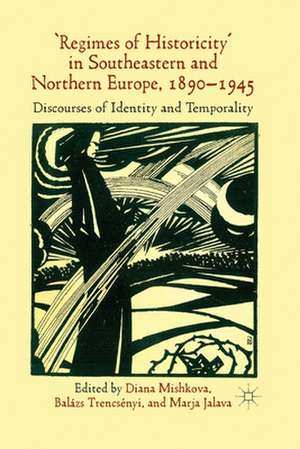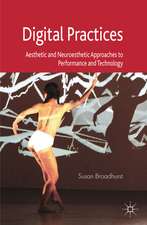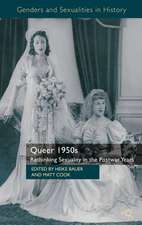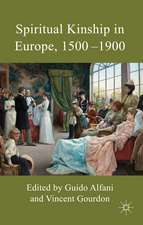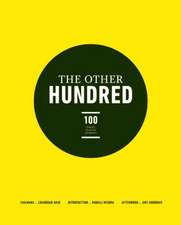'Regimes of Historicity' in Southeastern and Northern Europe, 1890-1945: Discourses of Identity and Temporality
Editat de D. Mishkova, B. Trencsényi, M. Jalavaen Limba Engleză Paperback – 2014
| Toate formatele și edițiile | Preț | Express |
|---|---|---|
| Paperback (1) | 730.47 lei 6-8 săpt. | |
| Palgrave Macmillan UK – 2014 | 730.47 lei 6-8 săpt. | |
| Hardback (1) | 739.00 lei 6-8 săpt. | |
| Palgrave Macmillan UK – 27 iun 2014 | 739.00 lei 6-8 săpt. |
Preț: 730.47 lei
Preț vechi: 890.82 lei
-18% Nou
Puncte Express: 1096
Preț estimativ în valută:
139.82€ • 151.93$ • 117.52£
139.82€ • 151.93$ • 117.52£
Carte tipărită la comandă
Livrare economică 21 aprilie-05 mai
Preluare comenzi: 021 569.72.76
Specificații
ISBN-13: 9781349472666
ISBN-10: 1349472662
Pagini: 361
Ilustrații: XII, 361 p.
Dimensiuni: 155 x 235 mm
Greutate: 0.53 kg
Ediția:1st ed. 2014
Editura: Palgrave Macmillan UK
Colecția Palgrave Macmillan
Locul publicării:London, United Kingdom
ISBN-10: 1349472662
Pagini: 361
Ilustrații: XII, 361 p.
Dimensiuni: 155 x 235 mm
Greutate: 0.53 kg
Ediția:1st ed. 2014
Editura: Palgrave Macmillan UK
Colecția Palgrave Macmillan
Locul publicării:London, United Kingdom
Cuprins
Introduction PART I: HISTORICAL CULTURES AND CONCEPTS OF TIME 1. Regimes of 'Balkan Historicity': The Critical Turn and Regional Time in Studies of the Balkans Before the First World War; Diana Mishkova 2. Latecomers and Forerunners: Temporality, Historicity, and Modernity in Early 20th Century Finnish Historiography; Marja Jalava 3. Temporality and Identity in Danish Historical Discourse, 1900–1945: Danish Historians Writing Modernity; Claus Møller Jørgensen 4. Regimes of Historicity, Identity and Temporality in Montenegro, 1905–1945; Frantisek Sištek 5. Temporalization and Professionalization: The Case of Lauritz Weibull and the Swedish Discipline of History; Simon Larsson PART II: THE IDEOLOGIES OF REGENERATION 6. Transcending Modernity: Agrarian Populist Visions of Collective Regeneration in Interwar East Central Europe; Balázs Trencsényi 7. Cooperative Modernity: Discursive Constructions of Social Order in the Bulgarian Cooperative Movement of the Interwar Period; Augusta Dimou 8. Revolutionary Change, Individualism, and Collectivism: Historicity in Anarchist Thinking and Its Socialist Critique in Early 20th Century Finland; Ralf Kauranen and Mikko Pollari 9. The Regimes of 'Degeneration' and 'Regeneration': Eugenics and Modernization in Bulgaria, 1900?1945; Gergana Mircheva 10. Generation, Regeneration and Discourses of Identity in the Intellectual Foundations of Romanian Fascism: The case of the AXA Group; Valentin S?ndulescu PART III: REPRESENTATIONS OF MODERNITY AND NATIONAL TEMPORALITIES 11. Regimes of Historicity and Discourses of Modernity: The Conceptualization of Past and Future in Swedish Social Sciences since the 1870s; Bo Stråth 12. Byzantium Evolutionized: Architectural History and National Identity in Turn-of-the-Century Serbia; Aleksandar Ignjatovi? 13. Modernist Folklorism: Discourses on National Music in Greece and Turkey, 1900?1945; Merih Erol 14. The Past, Present, and Future of the Muslim Millet: Discourses of Modernity andIdentity in Interwar Bulgaria, 1923?1939; Anna Mirkova 15. 'The Clash of Generations': The Identity Discourses of Romanian Jewish Intellectuals in the Interwar Period; Camelia Cr?ciun 16. 'Historical Truth and the Realities of Blood': Romanian and Hungarian Narratives of National Belonging and the Case of the Moldavian Csangos, 1920–1945; Chris Davis
Notă biografică
Camelia Cr?ciun, Federation of the Jewish Communities of RomaniaR. Chris Davis, Lone Star College in Houston, USAAugusta Dimou, University of Freiburg, GermanyMerih Erol, Harvard University, USAAleksandar Ignjatovi?, University of Belgrade, SerbiaRalf Kauranen, University of Turku, FinlandSimon Larsson, Uppsala University, SwedenGergana Mircheva, University of Sofia, Bulgaria Anna Mirkova, Old Dominion University, CanadaClaus Møller Jørgensen, Aarhus University, DenmarkMikko Pollari, University of Tampere, FinlandValentin S?ndulescu, independent researcher, BudapestFranti ek ístek, Czech Academy of SciencesBo Stråth, University of Helsinki, Finland
